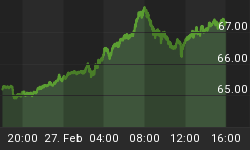Gold and silver were flat yesterday and have remained unchanged in Asian and early European trading. Gold is set for a fourth straight week of gains on safe haven demand and on the likelihood of further dollar declines with further reductions in U.S. and international interest rates and further quantitative easing next month.
Euro gold and British pound gold remained firm at €633 and £529 after recent gains. Even gold in Swiss francs (possibly the most defensive currency) remains near record highs of CHF1045 - gold is trading at CHF982 and is up by more than 10% against the Swiss franc in the last 52 weeks. Since the collapse of Bear Stearns and the start of the credit crisis in August 2007, gold has rallied strongly in all the major currencies including the Swiss franc. Gold is up from CHF800 to CHF982 or a healthy 22% in that crucial 15 month period. In the last 4 years, gold has nearly doubled in price in Swiss francs.
Volatility is set to continue in the gold market but it is important to realise that commodity and equity markets have been far more volatile in recent months.
Investors Continue to Ignore Geopolitical Risk
Geopolitical risk has been ignored in recent months as the financial and economic crisis has rightly taken centre stage. But it is important to remember that geopolitical risk remains an ever present threat as seen in the terrorist attacks in India. Tensions between the two nuclear powers, India and Pakistan, have risen sharply and India has hit out at Pakistan with the Prime Minister blaming "neighbours" over the attacks.

To attempt to analyse the gold market while completely continually ignoring geopolitical risk is a serious error. Geopolitically, the world remains beset by many serious risks, any of which could seriously impact western economies. Pakistan, North Korea, Lebanon and Israel are some of the hotspots posing risks in this regard. This was graphically illustrated when Benazir Bhutto was tragically assassinated in Pakistan and gold surged some $25 on safe haven buying due to fears regarding a nuclear bomb falling into the hands of Islamic militants in Pakistan.
The crux of the matter is that the western world, and particularly the US, is massively dependent on oil and gas exports from countries who are at best lukewarm and at worst outright hostile to them. Russia, Venezuela and Iran are some of the more obvious glaring examples of this.
Citigroup Report: Gold Holders "Mellow" for Years; Holders of Other Asset Classes Increasingly "Yellow"
Citigroup's excellent report yesterday (see actual report in Commentary section or at http://www.gold.ie/citigroup_gold_report.pdf) warned of the possibility of geopolitical instability in the coming years including civil unrest and massive political instability internationally and possible wars.
Most historians and economists believe that the Weimar inflation and Great Depression were important factors which led to World War II. The current global economic crisis is likely to create massive political tensions that could deteriorate into military conflict and war.
Citigroup report's authors warn of " ... further economic instability, which could lead to political instability in some nations and possibly even domestic regional unrest or worse. This deteriorating picture would also likely be a catalyst for Gold to perform well with a status of "safe haven".
Considered opinion is that all the gold in the world can fit in a 25 square metre cube so even a relatively modest change in the supply/demand dynamics could result in an outsize move in price. Gold has been used as a monetary instrument as far back as you can look. The same cannot be said about precious art or wine or fine cars etc. In times of extreme concern it is highly likely that it will regain that "luster".
As a consequence we remain of the view that gold will continue to perform well and will do particularly well as the consensus grows as to how we will come out of this mess (or not). Compared to just about every other asset class in the last 5 to 7 years holders of gold likely look mellow ... it is the holders of other assets that are looking a bit 'yellow'."















